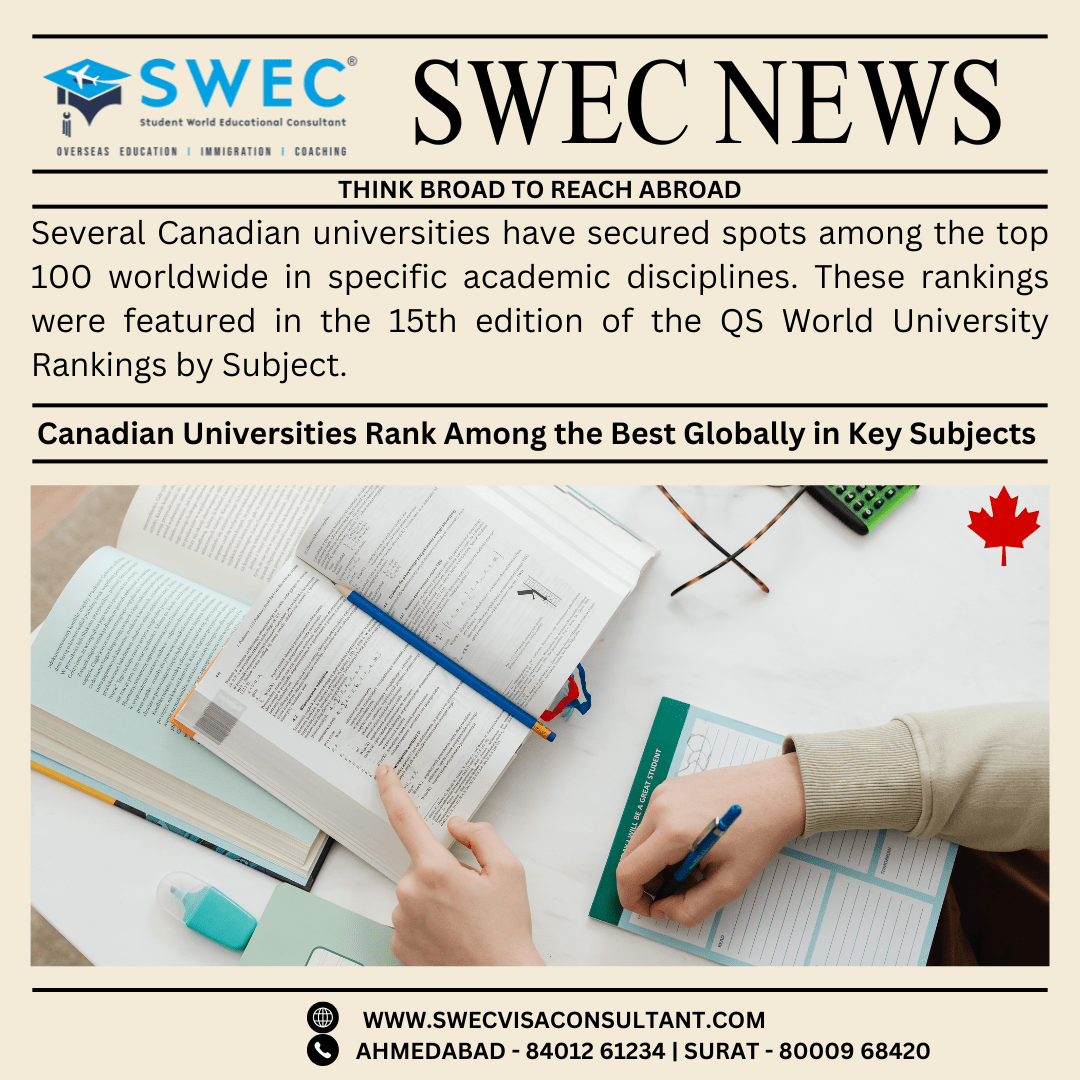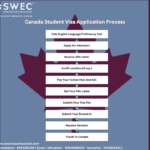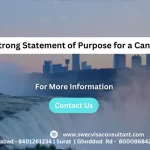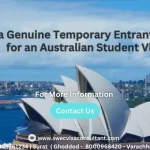Several Canadian universities have secured a spot among the top 100 globally for specific subjects, according to the latest rankings by Quacquarelli Symonds (QS).
In its 15th edition of the World University Rankings by Subject, QS evaluated a total of 55 subjects. This ranking helps students identify the best universities based on their academic interests and career goals.
These subjects are categorized into five main areas:
- Engineering and Technology
- Life Sciences and Medicine
- Natural Sciences
- Arts and Humanities
- Social Sciences and Management
Many top Canadian universities have been recognized globally in these categories, reinforcing Canada’s reputation for academic excellence.
Here are some Canadian universities that ranked among the world’s top 100 in different subject areas:
| University | Engineering and Technology | Life Sciences and Medicine | Natural Sciences | Arts and Humanities | Social Sciences and Management |
| University of Toronto | 17 | 13 | 20 | 14 | 14 |
| University of British Columbia | 31 | 25 | 22 | 19 | 20 |
| McGill University | 45 | 27 | 48 | 36 | 39 |
| University of Waterloo | 47 | — | 72 | — | — |
| McMaster University | — | 59 | — | — | — |
| University of Alberta | — | 86 | — | — | — |
If a specific ranking is not mentioned in the table above, it means the institution did not place among the top 100 for that subject.
Here are the subjects included in each subject area:
| Area | Subjects falling under that area |
|---|---|
| Engineering and technology | Data Science and Artificial Intelligence Engineering – Chemical Engineering – Civil and Structural Engineering – Electrical and electronic Engineering – Mechanical Engineering – Mineral and Mining Engineering – Petroleum |
| Life sciences and medicine | Agriculture and Forestry Anatomy and Physiology Biological Sciences Dentistry Medicine Nursing Pharmacy and Pharmacology Psychology Veterinary Science |
| Natural sciences | Chemistry Earth and Marine Sciences Environmental Sciences Geography Geology Geophysics Material Sciences Mathematics Physics and Astronomy |
| Arts and humanities | Archaeology Architecture and Built Environment Art and Design Art History Classics and Ancient History English Language and Literature History Linguistics Modern Languages Music Performing Arts Philosophy Theology, Divinity and Religious Studies |
| Social sciences and management | Accounting and finances Anthropology Business and Management Studies Communication and Media Studies Development studies Economics and Econometrics Education and Training Hospitality and Leisure management Law and Legal Studies Library and Information Management Marketing Politics Social Policy and Administration Sociology Sports Related Subjects Statistics and Operational Research |
The QS World University Ranking by Subject also allows users to filter universities based on specific subjects.
Methodology
The QS World University Ranking by Subject evaluates academic programs based on five key indicators:
- Academic Reputation – Based on surveys from academics, assessing which universities are known for strong research.
- Employer Reputation – Uses feedback from employers worldwide to determine how graduates from a university are perceived in the job market.
- Research Citations Per Paper – Measures how frequently a university’s research papers are cited.
- H-Index – Evaluates the productivity and impact of a university’s faculty and research based on citations.
- International Research Network – Examines how well a university collaborates with global institutions on research projects.
How to Get a Canadian Study Permit
If you want to study at a postsecondary institution in Canada, you will need a study permit. Here are the essential requirements:
- Letter of Acceptance – Issued by a Designated Learning Institution (DLI).
- Provincial or Territorial Attestation Letter (PAL/TAL) – Required as part of the application process.
- Proof of Financial Support – Demonstrates that you can cover tuition, living expenses, and other costs.
- Valid Passport and Travel Documents – Necessary for entry into Canada.
- Recent Photos – Must meet government specifications.
- Application Fees – Required for processing your permit.
The required proof of funds depends on how many family members will accompany you to Canada. This amount is in addition to your tuition fees and travel costs (such as airfare).
| Number of family members (including the applicant) | Amount of funds required per year ( |
| 1 | $20,635 |
| 2 | $25,690 |
| 3 | $31,583 |
| 4 | $38,346 |
| 5 | $43,492 |
| 6 | $49,051 |
| 7 | $54,611 |
If there are more than seven family members, an additional $5,559 must be added for each extra member.
You can use scholarships as part of your proof of financial support.
Note: The above table applies to all provinces and territories except Quebec.
How to Apply for a Canadian Study Permit
Step 1: Choose the Right Program and Institution
- Research programs that match your career goals.
- Ensure the institution is on Immigration, Refugees and Citizenship Canada’s (IRCC) list of Designated Learning Institutions (DLI).
- If you plan to work in Canada after graduation, check if your program qualifies for a Post-Graduation Work Permit (PGWP).
- If moving with a spouse who wants to work, check Spousal Open Work Permit (SOWP) eligibility. Currently, only master’s, doctoral, or select in-demand program students qualify.
Step 2: Apply to a DLI and Get a Letter of Acceptance (LOA)
- Submit your application to your chosen institution.
- If accepted, the institution will provide an LOA, which is required for a study permit.
- A student-visa-consultant can assist in preparing your application to increase your chances of acceptance.
Step 3: Gather Required Documents
- Most study permit applications are done online.
- Ensure you have all necessary documents, including proof of financial support, passport, and photos.
Step 4: Obtain a PAL or TAL
- A Provincial Attestation Letter (PAL) or Territorial Attestation Letter (TAL) is required.
- Your DLI will typically request this from the provincial or territorial authorities.
- Contact your DLI to understand the process.
Step 5: Apply for a Study Permit
- Complete the online application and answer questions to generate a personalized document checklist.
- Upload all required documents and pay the application fee.
Step 6: Receive Approval and Travel Documents
- If approved, you will receive a Letter of Introduction and a Temporary Resident Visa (TRV) or an Electronic Travel Authorization (eTA) to enter Canada.
- Show the Letter of Introduction to a Canadian immigration officer upon arrival to get your study permit.
- You may need to provide biometrics, medical exams, or police certificates as part of the process.
Final Thoughts
Canada remains a top destination for international students due to its world-class education system, diverse study programs, and strong global university rankings. The QS World University Ranking by Subject highlights the excellence of Canadian institutions across various fields, making it easier for students to choose the right academic path.
However, navigating the study permit application process can be complex. From selecting a Designated Learning Institution (DLI) to securing a Provincial Attestation Letter (PAL/TAL) and proving financial support, each step requires careful planning. Working with a student-visa-consultant can simplify the process and increase your chances of success.
SWEC is a trusted name in study abroad consulting, helping students achieve their dreams of studying in Canada and other top destinations. With expert guidance on university selection, visa applications, and financial documentation, SWEC ensures a smooth and hassle-free journey for aspiring international students. Whether you’re looking for assistance with student visa processing, PGWP eligibility, or scholarship opportunities, SWEC provides personalized support to make your study abroad dream a reality. For expert assistance, reach out to SWEC today and take the first step toward your global education journey!





